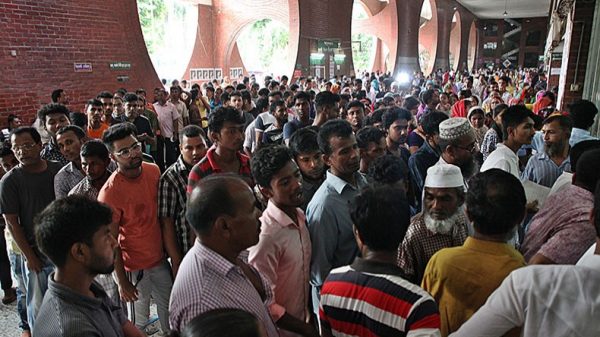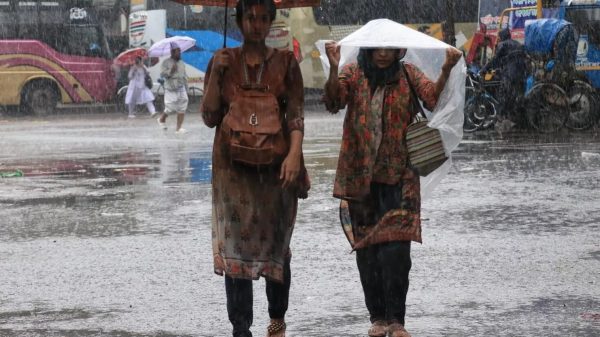None knows when new larvicide will arrive

The government agencies concerned are still unaware about when the new effective insecticide to control aedes mosquitoes responsible for the spread of dengue will arrive in the country.
Meanwhile, the number of patients infected with the virus is soaring across the country.
The authorities of the two Dhaka cities said that they were still relying on the old larvicide, already proved ineffective as admitted by the Dhaka mayors.
A disappointed High Court directed the local government ministry on Thursday to bring ‘effective’ larvicide within14 days.
The government’s health emergency and operation centre control room on Saturday said that at least 18 people died of dengue and 22,919 were hospitalised this year.
But unofficial reports say that at least 59 people died of the disease so far, including a woman in Madaripur who died on Saturday.
Local government and rural development minister Tajul Islam told New Age on Saturday evening that he could not confirm when the new larvicide would arrive in the country.
‘There is an adequate amount of larvicide in the stock of the two city corporations, which was imported earlier and they are spraying that regularly,’ he said.
Asked about the ineffectiveness of the larvicide and the High Court directives to bring effective larvicide within 14 days, Tajul said that the import of new larvicide was under process.
The minister did not answer the query if his ministry would be able to meet the deadline set by the HC.
‘New medicine is not important, but public awareness is more important for controlling aedes,’ he added.
Dhaka north city mayor Atikul Islam told New Age that a technical committee of the city corporation was analysing new larvicide samples before importing those for use.
He said that they had tested some samples of larvicide against aedes mosquitoes while some were still in the pipeline.
But the final decision about which larvicide would be selected for import was yet to be taken, the mayor said.
Meanwhile, according to state-owned news agency Bangladesh Sangbad Sangstha, scientists of Insect Biotechnology Division of the Institute of Food and Radiation Biology at the Atomic Energy Research Establishment have developed an effective method, known as Sterile Insect Techniques method, of controlling aedes mosquitoes which transmits dengue virus.
Science and technology minister Yeafesh Osman on Saturday visited the institute’s laboratory at Savar to witness the various technical aspects of the method, said BSS.
During the visit, the minister expressed his satisfaction over the innovation and instructed that the procedure should be taken to the field soon.
The minister assured all kinds of cooperation in this regard on behalf of the ministry.
In the SIT method, male aedes mosquitoes are sterilized by applying gamma ray. If a mosquito is exposed to dengue outbreak and meet with existing female aedes mosquitoes in nature no larvae coming from them can mature.
As the larvae are not fertilised, the number of mosquitoes starts to decrease.
This way, only infertile male mosquitoes will be exposed to nature. Since male aedes mosquitoes are unable to carry the dengue virus, there is no chance of them spreading it.
Furthermore, male aedes mosquitoes do not bite humans.
Meanwhile, Saturday’s control room report said that at least 1,649 dengue patients were hospitalised in the 24 hours ending at 8:00am on Saturday, with 969 in the capital and 680 in different districts.
On Saturday, at least 6,858 dengue patients were under treatment at hospitals across the country, with 4,477 in the capital and 2381 in different districts.
Among the patients, at least 693 were at Dhaka Medical College Hospital, 364 at Shaheed Suhrawardy Medical College Hospital, 319 at Mugda Medical College Hospital, 358 at Kurmitola General Hospital, 201 at Rajarbagh Police Lines Hospital, 142 at Dhaka Shishu Hospital and 226 at Holy Family Red Crescent Hospital.
Division-wise, at least 428 dengue patients were under treatment in Dhaka (excluding capital), 432 in Chittagong, 409 in Khulna, 325 in Rajshahi, 213 in Rangpur, 197 in Barishal, 100 in Sylhet and 277 in Mymensingh.
Health Minister Zahid Maleque, however, claimed that the overall dengue situation in the country is was ‘moderately under control now’.
‘There will not be any shortage of medicine as insecticides are being brought from abroad to control the dengue menace,’ he said.
Moreover, 2,00,000 kits have been bought for conducting dengue tests in private and public hospitals, the minister told reporters while visiting dengue patients at the Bangabandhu Sheikh Mujib Medical University hospital on Saturday afternoon.
Scientists say that the dengue situation can further worsen in the coming days as people from Dhaka would go to their villages for the Eid holiday.
People leaving Dhaka carrying the dengue virus can spread the disease to people in the rural areas, they say.
Institute of Epidemiology, Disease Control and Research adviser and its former principal scientist Mustaq Husain told New Age that members of the genus aedes are known vectors for numerous viral infections.
The two most prominent species that transmit viruses are aedes aegypti and aedes albopictus, which transmit the viruses that cause dengue and chikungunya fevers.
Aedes aegypti mostly live in urban habitats while aedes albopictus live in rural areas.
‘And dengue and chikungunya could be spread by the biting of either
aedes aegypti or aedes albopictus of any patients carrying dengue virus,’ said Mustaq.
























Leave a Reply